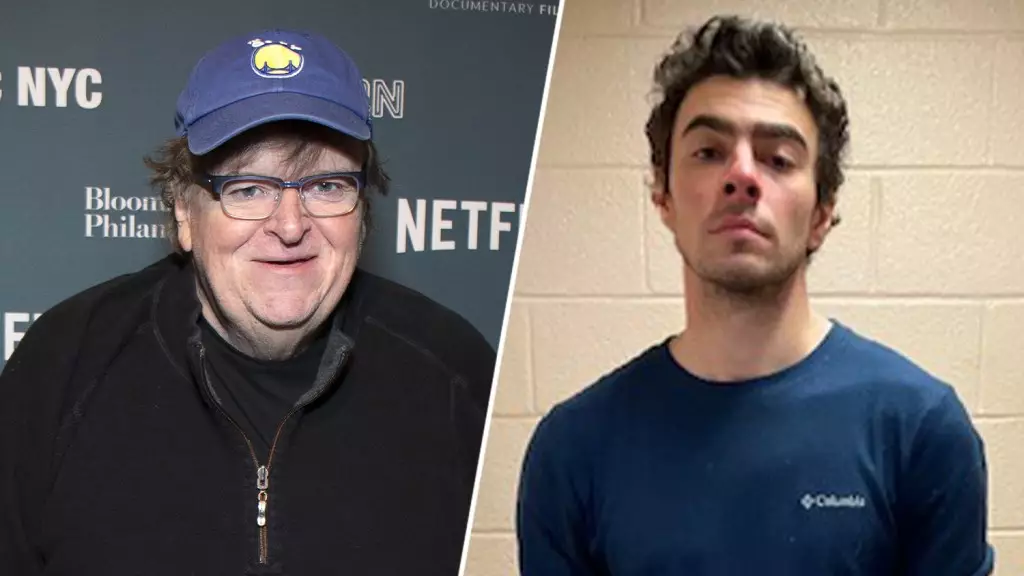The unfortunate death of Brian Thompson, the CEO of UnitedHealthcare, has sent ripples of shock across the nation. His murder has not only raised questions about personal safety within corporate hierarchies but has also ignited a fierce backlash against the healthcare industry as a whole. The suspect, Luigi Mangione, has been characterized not just by his involvement in Thompson’s death, but by the manifesto he left behind, which intriguingly mentions documentary filmmaker Michael Moore.
Instead of merely commenting on the sensationalism surrounding the killing, Moore has embraced the ensuing controversy to bring attention back to one of America’s most pressing crises—the for-profit healthcare system. His response serves not only as a condemnation of the violence but also as a rallying cry for those who feel marginalized and suffering under a system that consistently prioritizes profit over people.
In an open letter, Moore was unequivocal: he condemns murder, but he fervently defends the anger that has erupted following Thompson’s death. He suggests that this outrage is deeply rooted and long overdue. For Moore, the incident is not merely an isolated case of crime but a manifestation of a larger societal malaise—the consequences of a healthcare industry that has consistently failed the American public.
Critics may dismiss Moore’s statements as inflammatory, but he argues that the general public’s anger towards the healthcare system is authentic and justified. His emphasis on the “mass death and misery” inflicted by the system highlights the broader implications behind the murder—people suffering from chronic health issues and overwhelming medical debt amidst a landscape dominated by profit-driven motives. Moore implores the media to not shy away from these sentiments, urging a more profound exploration of the issues at hand.
Moore’s commentary underscores a distressing reality: the very foundation of the for-profit healthcare industry is built on instability and emotional distress for the average American. With terms such as “denied claims” and “bottomless deductibles” resonating with countless individuals, it becomes evident that many are caught in a harrowing cycle of inadequacy and fear. The fear of not receiving necessary medical care should not be a burden that any citizen has to bear—a sentiment that Moore passionately advocates.
Therein lies a fundamental paradox: while many Americans buy into the notion that their health insurance will safeguard them in times of need, the reality often tells a different story. Instead of providing security, these policies frequently become another source of anguish, leading to financial ruin and even preventable deaths. For many, the anger brewing in response to Thompson’s murder is not a threat to societal norms, but a necessary and overdue examination of a system that relegates human lives to mere numbers on a balance sheet.
Rethinking Accountability and Reality
Moore’s assertion that “no one needs to die” speaks volumes about the ethical responsibilities of those at the helm of the healthcare industry. The reality that individuals lose their lives because they lack adequate health insurance is an abomination that calls for accountability. Despite the wealth behind companies like UnitedHealthcare, the system appears to thrive on the very misery it perpetuates.
As he critiques the actions of Mangione, who hails from a wealthy family, Moore makes it clear that violence is not the solution to the healthcare crisis. It is a rich-on-rich crime that does not encapsulate the grievances of the everyday American struggling against a system stacked heavily against them. This juxtaposition serves to highlight the deep societal fractures that exacerbate the pain felt by millions over time.
A Broader Reflection on Society’s Health
In the aftermath of this tragedy, Moore’s letter serves as a potent reminder that systemic issues often bubble to the surface in moments of crisis. Beyond the headlines and media sensationalism lies an urgent need for a reckoning: an urgent and honest examination of how the healthcare system continues to fail the very individuals it is supposed to protect.
The release of Moore’s documentary *Sicko* stands as a testament to this ongoing struggle, offering a critical perspective on a system that often prioritizes profits over the basic human right to healthcare. As the saga unfolds, it is imperative that the underlying issues are not glossed over, but rather confronted head-on. The true challenge now lies in translating this anger into meaningful change, ensuring that no one suffers in silence under the weight of unyielding medical debt and inequity.

